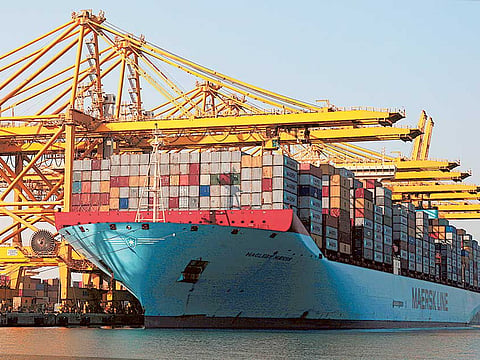Dubai’s non-oil foreign trade at Dh647 billion in first half 2016
To offset impact of global slowdown, Dubai broadened revenue sources

Dubai: Dubai saw a 17 per cent surge in the total volume of traded goods in the first half of 2016, rising as high as 49 million tonnes of commodities from 41 million tonnes the same period last year.
Dubai’s non-oil foreign trade added up to Dh647 billion from January to June 2016. Imports had the lion’s share at Dh401 billion, while exports and re-exports accounted for Dh74 billion and Dh172 billion, respectively.
The latest trade figures released by Dubai Customs indicate that Dubai is progressing well in its plan to reduce reliance on oil revenues and move towards an economy that depends on foreign trade as well as other income sources.
“To offset the impact of the general slowdown in world economy, lower commodity prices and the slump in oil prices, Dubai has wisely restructured and broadened its sources of revenue while taking considerable measures to stimulate growth in the affected sectors,” said DP World Group Chairman and CEO and Chairman of Ports, Customs and Free Zone Corporation, Sultan Ahmed Bin Sulayem.
Dubai, according to Bin Sulayem, has early on realised that attracting foreign investments is a necessary must-do step. To maintain Dubai’s business appeal, an advanced trade infrastructure, convenient government services at seaports and airports, a well-established legislative structure and a unique public-private partnership were all in place.
As Dubai has already positioned itself as a leading global and regional IT trading hot spot, smart, mobile and fixed phones made up the biggest chunk of the commodities traded through Dubai’s borders in H1 2016, with a total value of Dh84 billion, whilst computers amounted to Dh20 billion.
Dubai’s foreign trade of automobiles had a Dh30 billion share, which reflects the emirates’ healthy automotive market. Petroleum oils worth of Dh21 billion were traded across Dubai during the first six months of this year.
Dubai’s growing tourism and travel industry, coupled with strong consumer purchasing power of local populations, continued to sustain foreign trade in precious metals and gemstones. Gold represented Dh75 billion of Dubai’s total foreign trade. Diamonds reached Dh51 billion worth of trade, while jewellery was valued at Dh34 billion.
With a bilateral trade worth Dh79 billion, China was — by far — Dubai’s primary trading partner in H1 2016. India came in second with bilateral trade at Dh48 billion. The USA followed closely with Dh43 billion trade value. Once again, the Kingdom of Saudi Arabia was Dubai’s fourth top trading partner globally and first in the GCC and Arab regions, at Dh27 billion. A 12 per cent upsurge in trade was enough to make Germany Dubai’s fifth top trading partner, with a trade value of Dh24 billion. Moreover, a substantial increase of 49 per cent in trade value was recorded between Switzerland and Dubai, taking their two-way commerce to Dh23.7 billion.
Direct trade was the main component of Dubai’s foreign trade in H1 2016, standing at Dh420 billion. Free zones and customs warehouses contributed Dh211 billion and Dh16 billion, respectively.
In terms of modes of cargo conveyance, Dh300 billion worth of goods were conveyed by air, Dh233 billion by sea, and Dh113 billion of cargo value was carried by land.
Sign up for the Daily Briefing
Get the latest news and updates straight to your inbox



